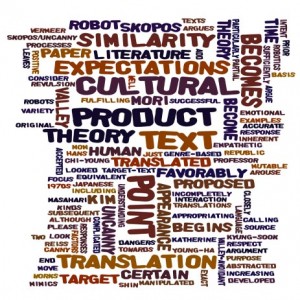 I really hate writing abstracts even though they flow pretty easily from my word-processor. Getting the jargon in there is aggravating.
I really hate writing abstracts even though they flow pretty easily from my word-processor. Getting the jargon in there is aggravating.
Still, here is the abstract for a conference presentation I am proposing for Sogang University this summer (please, comments and suggestions are extremely welcome):
Skopos, The Uncanny Valley, and Translation
Charles Montgomery
Dongguk University
English Linguistics, Translation and Interpretation
Katherine Reiss and Hans Vermeer’s Skopos Theory, developed at the end of the 1970s, argues that translations are mutable on the basis of the complicated interaction of a variety of factors, most of which add up to fulfilling the purpose of the target text. Just prior to this time, Japanese robotics professor Masahiro Mori proposed the theory of the “uncanny valley,” although at that time only in respect to the appearance of robots. Mori’s theory proposed that as a robot’s appearance becomes more human, human responses to that robot become more empathetic until a certain point at which a partial but incompletely similarity begins to arouse revulsion. Then, at a subsequent point of increasing similarity, to the point of exact similarity, emotional response again becomes positive. This theory can be abstracted to the argument that as any product (including translated literature) begins to move towards the cultural expectations of that product, it will be looked upon more favorably until that point at which it closely, but not sufficiently, mimics the cultural expectations of the cultural product; and, again, when it becomes equivalent to the expectations of that cultural product it will again be accepted favorably. This paper will argue that by appropriating the target-text focus of Skopos Theory and understanding the dangers inherent in translation that leaves text in the “uncanny valley,” certain kinds of text, particularly genre-based texts, can be manipulated in translation to be both accurate to the original intent of the literature in its source text as well as to become “canny” in the target language. This paper will consider two works translated by Kim Chi-young, Kim Young-ha’s Your Republic is Calling You and Shin Kyung-sook’s Please Look After Mom as examples of successful Skopos/Uncanny Valley-avoidant translation processes.
Keywords: Skopos Theory, Uncanny Valley, Genre, Translation


